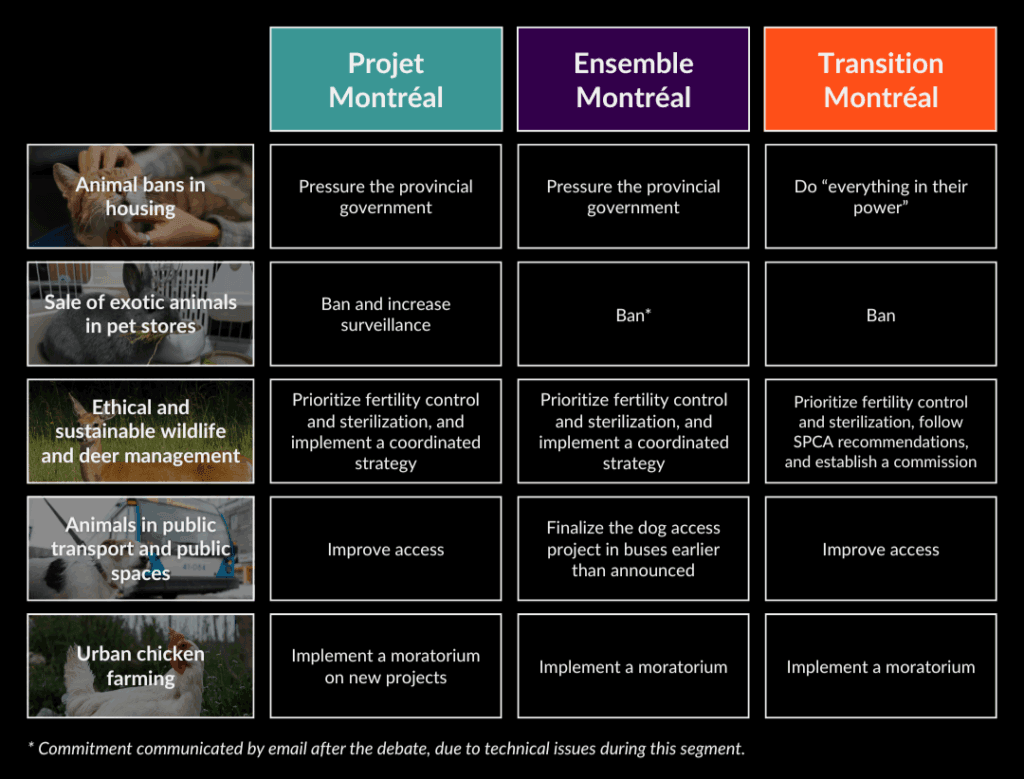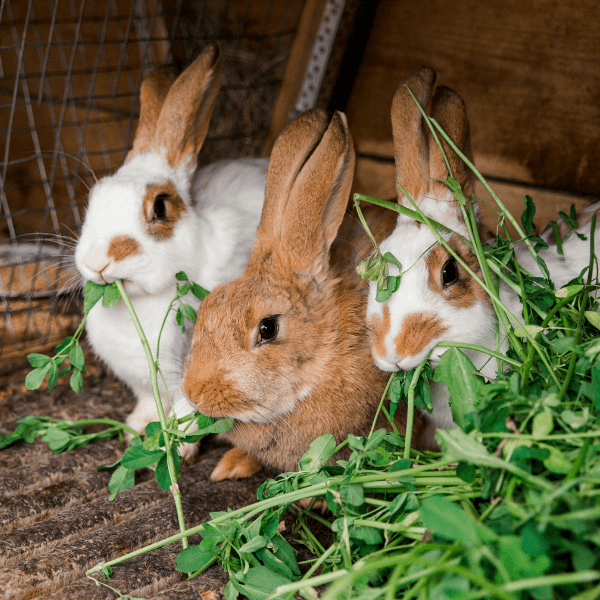Summary of the municipal parties’ positions on animal issues

Sterling Downey (Projet Montréal), Nathe Perrone (Transition Montréal) and Gabriel Retta (Ensemble Montréal) took part in a debate on key issues related to animal protection and management, as part of the municipal elections.
The full event can be found here (French only):

In Montreal, significant progress has already been made in recent years thanks to the work of the SPCA. However, several additional measures must be implemented if Montreal is to continue to stand out as a leader in animal protection. These measures include:
Though the City of Montreal banned pet stores from selling dogs, cats, and rabbits other than those sourced from shelters in 2018, small exotic animals (birds, reptiles, amphibians, and small mammals) continue to be excluded from this by-law. Yet these species have complex and specific biological needs of which the public is too often unaware. Impulse buying such animals in pet stores frequently leads to neglect, abandonment, and suffering due to inadequate care. Additionally, the exotic pet trade relies on a problematic supply chain, in which animals are captured, bred, transported, and sold in inhumane and insufficiently regulated conditions.
In the face of urban sprawl and the growing effects of climate change, the City of Montreal must rethink its approach to coexistence with wildlife. The systematic use of lethal methods to deal with species that are deemed problematic is no longer an acceptable option. Ethical and responsible wildlife management is based on science, expertise, and non-lethal approaches that focus on prevention and adaptation. The Montreal SPCA is therefore calling for the adoption of an official wildlife management policy that focuses on early detection of coexistence issues, emphasizes preventive measures, favours the use of non-invasive solutions, and relies on fertility control methods when it is necessary to reduce populations.
Urban chicken farming is part of a growing trend toward local, non-industrial, small-scale agriculture in response to animal welfare issues arising from industrial agriculture. However, this practice raises significant concerns, both in terms of animal welfare and the management of abandoned animals. Public health and nuisance issues also add to the list of considerations. Since 2021, the SPCA has been calling for a coordinated city-wide strategy to be developed in partnership with all stakeholders. Pending such a strategy, the Montreal SPCA is asking for a moratorium on the authorization of new urban chicken farming projects.
In partnership with committed citizens across the province who are deeply concerned about animal welfare, the SPCA has identified the following collective priorities for other municipalities:
Provincial regulations allow dogs to be tethered to a fixed object for up to 23 hours a day. Dogs are intelligent, active animals that need stimulation, an outlet for their energy and social interaction. When they are isolated and deprived of the opportunity to socialize, play, exercise, or express their natural behaviours, chained dogs develop severe boredom and frustration, which can lead to psychological distress. A tethering ban would not apply to temporary forms of tethering that are not harmful to dogs’ welfare, but rather to the practice of keeping a dog tethered to a fixed object (doghouse, post, etc.) continuously or for extended periods of time.
Cat overpopulation is a growing issue in Quebec, with serious consequences for animal welfare. Without intervention, cats left to fend for themselves lead a life of suffering marked by hunger, cold, and disease. Faced with this reality, many municipalities still opt for capture and euthanasia. However, this method is ineffective in the long term due to the vacuum effect: new cats will always move into the vacated territory. Fortunately, ethical solutions exist and have proven effective in many other municipalities across Canada and elsewhere in the world. TNRM (Trap, Neuter, Release, Maintain) programs stabilize cat populations by limiting reproduction, while improving the quality of life for cats and reducing potential nuisances for the neighbourhood.
(for municipalities not currently served by an SPCA or SPA that is a member of the Association québécoise des SPA et SPCA (AQSS).
An animal service provider’s primary mission should be animal welfare and, therefore, its services and programs should focus on reuniting lost animals with their families, responsible adoption of sterilized animals, and ethical management of overpopulation. Entrusting this responsibility to private, for-profit companies, such as pounds or animal controllers, raises significant concerns. These entities may seek to maximize profits at the expense of animal care or service quality, or by neglecting to sterilize animals prior to adoption. In some cases, they even profit from overpopulation and animal surrenders by being paid based on the number of animals they take in. Municipalities must prioritize responsible, transparent animal services that make the best interests of animals and the community the focus of their work.
Pet stores are a direct outlet for puppy mills and other unscrupulous breeders who reproduce animals in conditions that jeopardize welfare, without regard for overpopulation. By encouraging impulse purchases and mass breeding in a context where shelters are already operating at full capacity, this industry contributes to animal abandonment and euthanasia. Regulating the sale of animals in pet stores by requiring them to be sourced from shelters not only reduces overpopulation, but also gives homeless animals a second chance. It also protects adopters by reducing the risk of health or behavioural problems.
Join our citizen mobilization Facebook group and take part in coordinated actions.
Animals are counting on you to hold your municipal candidates accountable!
Do you have any questions? Need advice? Write to us at defense@spca.com



